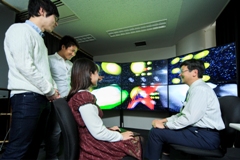Faculty of Science and Engineering
Information and System Engineering

“Information and System Engineering” is one of the multi-disciplinary areas of research that quantifies or qualifies respective events, formulates or regularizes problems into forms that are processable on computers, describes required information processing with computer codes, and inherits to develop the technology of designing, building, and operating high-performance information systems efficiently.
For this purpose, the faculty members in the Department of Information and System Engineering (ISE) are all active researchers in the domains of social information, visual information, mathematical information, intelligent information, and life information, which are covered by the Institute of Electrical and Electronic Engineers (IEEE) and the Association for Computing Machinery (ACM).
In particular, the department offers an original series of classes “Software Project on CG, VR, and Image Processing 1-4” that takes a practical approach to cultivating IT engineers who can create advanced 3D contents concerning computer graphics (CG), virtual reality (VR), and image processing. These have the potential to appear in next-generation games through project-based learning (PBL) that provides undergraduate students with a strong incentive for learning through teamwork in software development, an approach that is common in information and system engineering.
Fields of interest
- Algorithm Theory, Algorithmic Differentiation, Graph Algorithm, Random Structures and Algorithms
- Artificial Intelligence, Expression Recognition, Machine Psychology, Neual Networks and Machine Learning
- Augmented Reality, Color Perception, Computer Graphics, Virtual Reality, Visualization
- Combinatorial Matrix Theory, Combinatorial Optimization, Discrete Optimization
- Computer Science, Computational Topology, Cutting and Packing, Theoretical Computer Science
- Cybernetics, Medical Engineering
- Differential-Algebraic Equations, Mathematical Informatics, Numerical Processing
- Distributed computing, Elliptic and Hyperelliptic Curve Based Cryptography, Information Theory
- Engineering Education
- Geometry Processing, Logistics, Operations Research, Railway Optimization, Spatial Information Technology, Transportation









